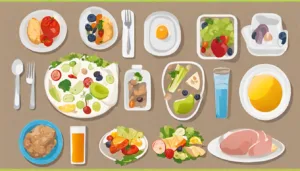Introduction
Ensuring a balanced diet for a child between the ages of 5 to 12 is crucial for their growth and development. In this comprehensive guide, we delve into the key aspects of crafting a nutritious diet that fosters optimal health and vitality.
1. Understanding the Balanced Diet for Child of 5 to 12 Years
Providing a foundation for a child’s overall well-being, a balanced diet encompasses a variety of nutrients essential for growth, cognitive development, and immunity.
2. The Core Components of a Balanced Diet
Exploring the primary components—proteins, carbohydrates, fats, vitamins, and minerals—that contribute to a child’s balanced diet. Learn how each element plays a vital role in their health.
3. Importance of Nutrient-Rich Foods
Delve into the significance of incorporating nutrient-dense foods, such as fruits, vegetables, whole grains, and lean proteins, to meet the unique nutritional needs of children in this age group.
4. Balanced Diet for Cognitive Development
Uncover the connection between nutrition and cognitive function in children. Discover foods that promote brain health and support optimal learning and concentration.
5. Hydration for Health
Highlighting the often overlooked aspect of hydration in a child’s diet. Learn about the importance of water intake and how it impacts overall health and well-being.
6. Addressing Picky Eating Habits
Offering practical tips for parents dealing with picky eaters. Explore creative ways to introduce a variety of foods and make mealtime an enjoyable experience.
7. The Role of Snacking in a Balanced Diet
Discussing the significance of healthy snacks in maintaining a balanced diet. Discover nutritious snack options that cater to a child’s taste buds while meeting nutritional requirements.
8. Physical Activity and Nutrition
Understanding the synergy between physical activity and nutrition for a child’s holistic development. Learn how a balanced diet complements an active lifestyle.
9. Meal Planning and Preparation
Providing insights into effective meal planning and preparation strategies. Explore convenient and nutritious recipes that cater to the preferences of children.
10. Balanced Diet for Child of 5 to 12 Years: A Parent’s Guide
Fruits and Vegetables:

Include a variety of colorful fruits and vegetables in their daily meals.
Strive to include a minimum of five servings of fruits and vegetables in your daily diet
They provide essential vitamins, minerals, and fiber.
Protein:
Include good sources of protein such as lean meat, poultry, fish, eggs, dairy products, beans, lentils, and nuts.
Whole Grains:
Choose whole grains like whole wheat bread, brown rice, oats, and quinoa.
Whole grains provide fiber, vitamins, and minerals.
Dairy or Alternatives:
Include sources of calcium such as milk, yogurt, and cheese.
If a child is lactose intolerant or follows a plant-based diet, consider fortified plant-based milk alternatives like almond milk or soy milk.
Healthy Fats:
Incorporate healthy fat sources like avocados, nuts, seeds, and olive oil into your diet
Omega-3 fatty acids, found in fatty fish like salmon, are important for brain development.
Limit Added Sugars and Processed Foods:
Reduce the consumption of sugary drinks, candies, and processed foods
Opt for whole, unprocessed foods whenever possible.
{Read more for health}
Hydration:
Encourage water as the primary beverage.
Portion Control:
Avoid skipping meals, especially breakfast, which is important for energy and concentration.
Encourage Healthy Eating Habits:
Make meals a positive and enjoyable experience.
Involve children in meal planning and preparation.
Be a role model by making healthy food choices yourself.
Remember that individual dietary needs may vary, and it’s always a good idea to consult with a healthcare professional or a registered dietitian for personalized advice based on a child’s specific health conditions and requirements
Empowering parents with practical advice on fostering healthy eating habits in children. Addressing common challenges and offering solutions for creating a positive food environment.
FAQs about Balanced Diet for Child of 5 to 12 Years
Q: What are the key nutrients essential for a child’s growth?
A: Essential nutrients include proteins, carbohydrates, fats, vitamins, and minerals, each playing a crucial role in supporting a child’s development.
Q: How can parents encourage their child to try new foods?
A: Encourage experimentation with new foods by involving children in meal preparation, making it a fun and educational experience.
Q: Is snacking important in a child’s diet?
A: Yes, healthy snacks provide essential nutrients and help maintain energy levels between meals. Opt for nutritious snack options like fruits, yogurt, or nuts.
Q: How does hydration impact a child’s health?
A: Proper hydration is vital for overall health, influencing digestion, cognitive function, and energy levels. Ensure your child drinks an adequate amount of water daily.
Q: What role does physical activity play in a child’s nutrition?
A: Physical activity complements a balanced diet by promoting overall health, supporting bone development, and maintaining a healthy weight.
Q: How can parents deal with picky eaters?
A: Introduce a variety of foods gradually, involve children in meal planning, and be patient. Creating a positive eating environment can encourage healthy eating habits.
Conclusion
In conclusion, providing a balanced diet for a child aged 5 to 12 years is a foundational element of fostering their overall health and well-being. By understanding the essential components, addressing challenges, and incorporating practical tips, parents can ensure their child receives the nutrition necessary for optimal growth and development.


Great helpful article